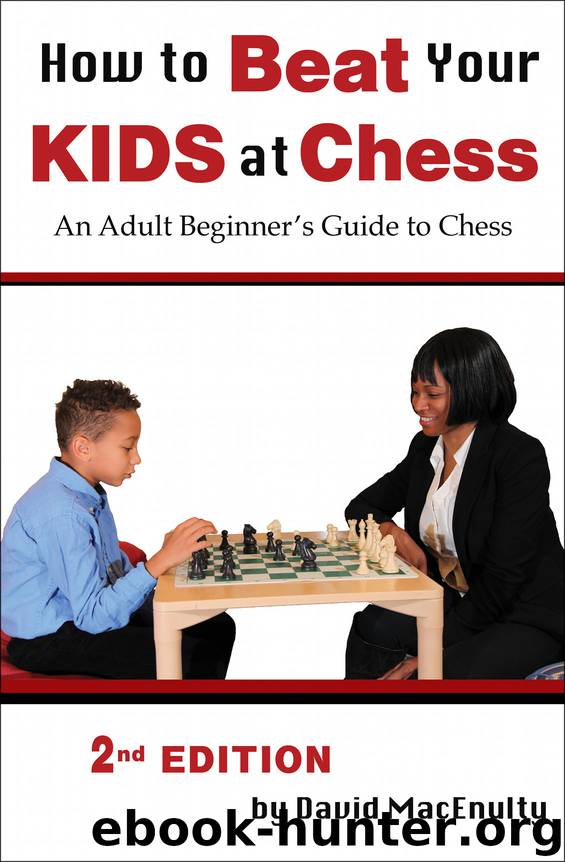How to Beat Your Kids at Chess by David MacEnulty

Author:David MacEnulty [MacEnulty, David]
Language: eng
Format: epub
Publisher: Russell Enterprises, Inc.
Published: 2013-01-03T20:48:00+00:00
Note that the king, queen, and rooks did not venture out into the field of play.
Most of the time, these four important pieces do not like to mix it up with the knights, bishops, and pawns in the early stages of the game. Later, we will look at why these pieces do not usually join the activity in the middle of the board.
Obviously the moves just given are a bit artificial, as Black has made no moves at all. In an actual game this would be almost impossible to achieve, as Black will also be trying to control the center and to thwart White’s plans. The real point of this is to show how to get the minor pieces out to good squares and to get the rooks and queen developed.
Note that each piece was moved only once, and only two pawns had to move in order to complete development.
This brings up two other opening principles related to development:
1. As much as possible, move each piece only once in the opening.
The reason for this is quite simple. If you take two moves with one piece, at the end of the two moves you will have only that one piece out. But if you use those two moves to develop two pieces, you will have two pieces out. Therefore, moving a piece a second (or third) time before completing your development will slow your development. Chess players are often distracted by a seemingly clever idea and then fall behind in development, and that is usually very bad. Keep your eye on development at all times in the opening.
As you progress in chess you will find exceptions in some openings where one piece can (and should) move two or more times before the other pieces are brought out. When you come across these situations try to understand the reasons for each exception. Even very strong players sometimes make errors in judgment regarding this area, so it is never one to ignore.
2. Avoid making unnecessary pawn moves in the opening.
Again, the reason is simple. Since pawn moves are not developing moves, every time you move a pawn you are not developing a piece. Moving the two center pawns is essential in most openings, but after that you should have a really good reason for other pawn moves.
There are many opening systems that call for three or even four pawn moves, but as with the advice about moving pieces twice in the opening, a player should be clear about what is a good pawn move and what is a waste of time. When the engagement begins, the player with the most pieces in the field has the better chances of coming out ahead.
We will now look at the king, queen, and rooks in the opening.
Download
This site does not store any files on its server. We only index and link to content provided by other sites. Please contact the content providers to delete copyright contents if any and email us, we'll remove relevant links or contents immediately.
The Infinite Retina by Robert Scoble Irena Cronin(6231)
Harry Potter and the Cursed Child: The Journey by Harry Potter Theatrical Productions(4484)
The Sports Rules Book by Human Kinetics(4367)
Molly's Game: From Hollywood's Elite to Wall Street's Billionaire Boys Club, My High-Stakes Adventure in the World of Underground Poker by Molly Bloom(3522)
A Knight of the Seven Kingdoms by George R R Martin(3302)
How To by Randall Munroe(3093)
Quidditch Through the Ages by J.K. Rowling(3090)
Flowers For Algernon by Daniel Keyes(3082)
Quidditch Through the Ages by J K Rowling & Kennilworthy Whisp(2955)
Stacked Decks by The Rotenberg Collection(2865)
Quidditch Through the Ages by Kennilworthy Whisp by J.K. Rowling(2842)
Quidditch through the Ages by J. K. Rowling(2785)
776 Stupidest Things Ever Said by Ross Petras(2763)
Quidditch Through The Ages by J. K. Rowling(2752)
Ready Player One: A Novel by Ernest Cline(2700)
What If?: Serious Scientific Answers to Absurd Hypothetical Questions by Randall Munroe(2689)
Beautiful Oblivion by Jamie McGuire(2595)
The Book of Questions: Revised and Updated by Gregory Stock Ph.d(2554)
Champions of Illusion by Susana Martinez-Conde & Stephen Macknik(2439)
